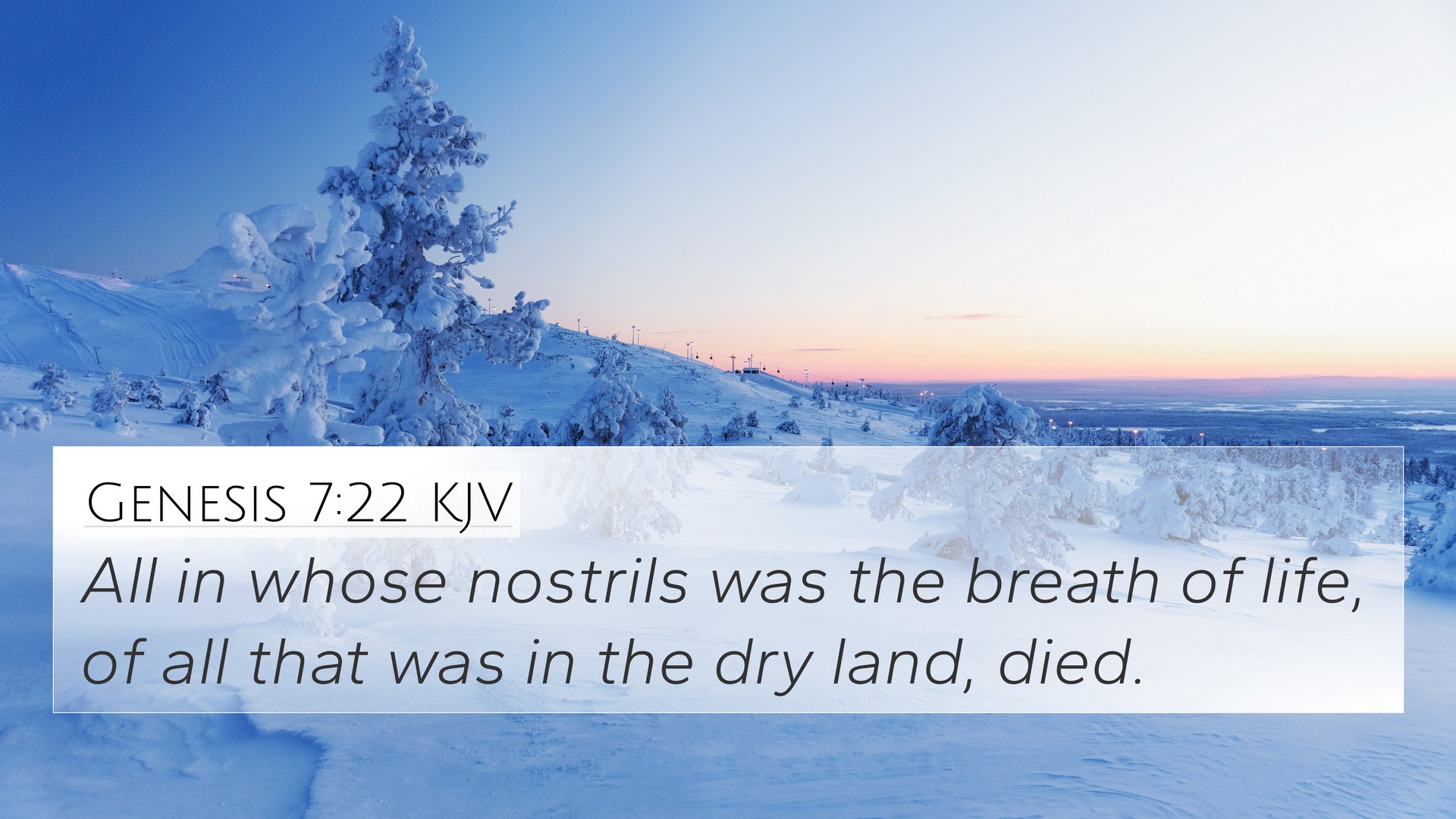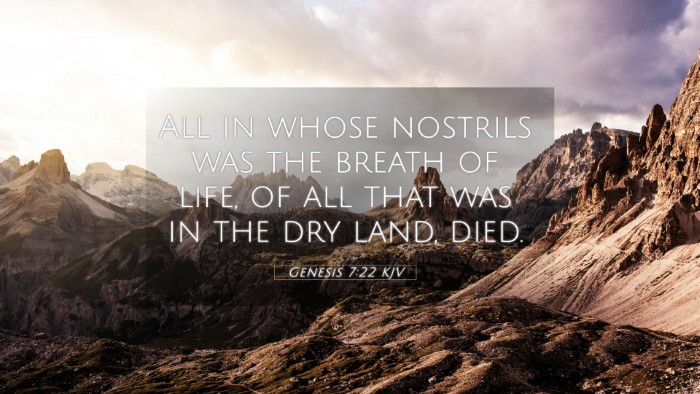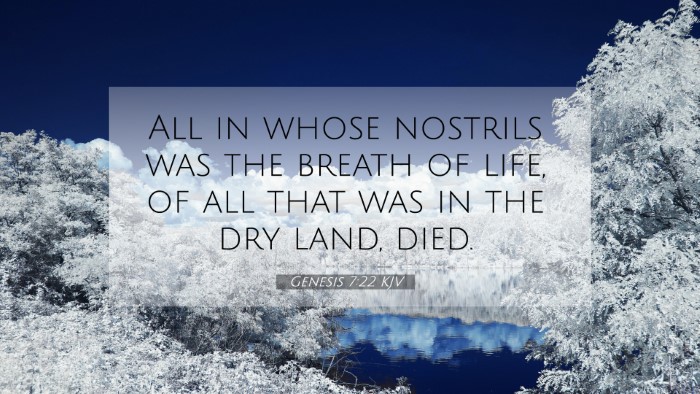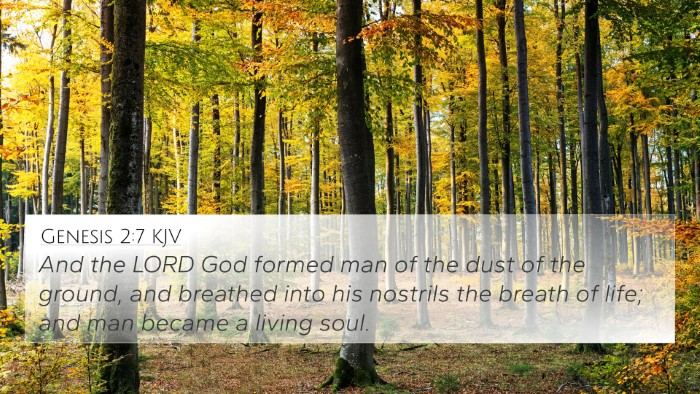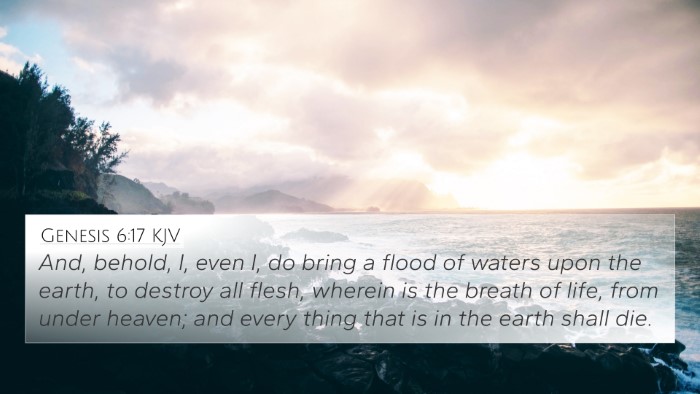Understanding Genesis 7:22
Genesis 7:22 states, "All in whose nostrils was the breath of life, of all that was on the dry land, died." This verse encapsulates a significant event during the flood narrative, illustrating God's judgment upon a degenerate world. Addressing its meaning through various public domain commentaries provides a deeper understanding.
Commentary Insights
The verse affirms the totality of destruction during the Deluge where humanity and animals alike perished due to God's decree. Commentators such as Matthew Henry, Albert Barnes, and Adam Clarke shed light on different aspects of this judgment.
-
Matthew Henry's Commentary:
Henry emphasizes that this verse illustrates the seriousness of God's wrath against sin and corruption. He notes that the flood was a divine response to a morally depraved society, highlighting the consequence of turning away from righteousness.
-
Albert Barnes' Notes:
Barnes remarks on the universality of death in this scenario, asserting that even the most innocent creatures perished along with humans, which underscores the gravity of humanity's sin. He explains that the breath of life is tied to God's creative power, which was now strikingly removed.
-
Adam Clarke's Commentary:
Clarke elaborates on the phrase "the breath of life," which indicates God's spirit residing in living beings. His interpretation suggests a deeper theological reflection on the sanctity of life and the severe consequences of collective wrongdoing.
Cross-References for Genesis 7:22
This verse connects deeply with several others in the Bible, providing a comprehensive view of divine judgment and redemption. Here are 10 significant cross-references:
- Genesis 6:17: "And behold, I, even I, am bringing the flood of waters upon the earth..." – A precursor detailing the flood's purpose.
- Genesis 1:30: "And to every beast of the earth, and to every fowl of the air... I have given every green herb for meat." – Reflects on God's provision for life.
- Genesis 7:21: "And all flesh died that moved upon the earth..." – This directly complements verse 22, reiterating the total demise.
- Romans 6:23: "For the wages of sin is death..." – A New Testament illustration of sin's ultimate consequence.
- Matthew 24:37-39: "But as the days of Noah were..." – Jesus draws parallels between the flood and future judgment.
- Hebrews 11:7: "By faith Noah, being warned of God..." – Noah's actions are prompted by God’s warning and depict faith amidst judgment.
- 2 Peter 2:5: "And spared not the old world, but saved Noah..." – References God's judgment and the preservation of the faithful.
- Isaiah 54:9: "For this is as the waters of Noah unto me..." – God’s promise of mercy post-judgment is highlighted.
- Luke 17:26-27: "And as it was in the days of Noah..." – Emphasizes the moral state of society leading to God's wrath.
- Revelation 20:14: "And death and hell were cast into the lake of fire..." – Culminates the theme of judgment throughout Scripture, similar to the flood narrative.
Thematic Connections
Genesis 7:22 provides ample material for Bible verse cross-references. By examining connections between Bible verses, one can understand the important themes such as divine judgment, loss of life, and ultimate redemption through God's promise. This verse acts as a foundation for exploring comparative Bible verse analysis regarding sin and its consequences.
How to Utilize Cross-References
Engaging with tools for Bible cross-referencing allows deeper insights into Scripture. By consulting a Bible concordance or a cross-reference Bible study guide, you can uncover how verses relate to and inform one another:
- Identify themes prevalent in narratives.
- Connect accounts of God’s judgment and mercy across both Testaments.
- Utilize cross-references for sermon preparation or personal study.
Conclusion
Genesis 7:22 serves as a poignant reminder of the severity of God's judgment. By leveraging Bible verse parallels through cross-referencing, believers can explore the profound implications of divine retribution and grace found throughout the Scriptures. Understanding verses in their broader context enhances spiritual insight and provides essential tools for Bible study.
